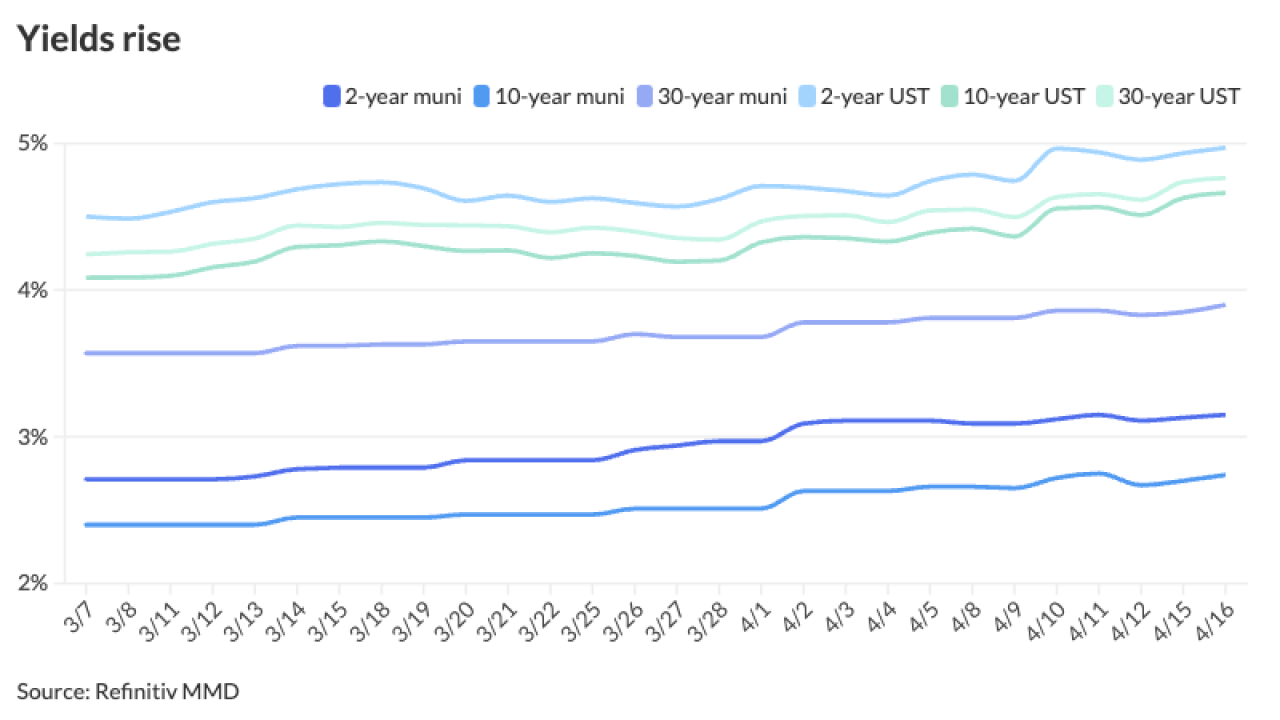
DALLAS - New-issue volume in the municipal market fell for the fourth consecutive month in February, as turmoil from the subprime mortgage crisis continued to roil bond insurers and disrupt the auction-rate securities market and other sectors.
With 637 issues totaling $20.1 billion sold last month, volume was down 37% versus February 2007, according to preliminary data from Thomson Financial. That came on the heels of a 37% plunge in January, which sent volume to the lowest monthly production levels since September 2001. The rate of bond insurance penetration fell to 27.05% last month from 56.29% in the same month a year ago, showing how issuers are moving away from using bond insurance at the same levels as in prior years.
While February had 67 fewer deals than January, the dollar volume of bonds sold rose by more than $400 million. However, trend lines remain troubled, analysts say, with tender-option bond funds in the sell mode as bidders rush for the exits.
"From the buy side, this is really kind of the perfect storm," said Chris Ihlefeld, co-portfolio manager at Thornburg Investment Management. "There's a lot of fear in the market and an absence of capital. New issuers don't want to sell into this kind of market, so a lot of deals are being shelved."
At the same time, anecdotally there is a lot of activity in the secondary market.
"It wasn't long ago when the TOBs were buying up all this stuff," Ihlefeld said. "Now these guys are being mandated to liquidate some of their positions."
Market sources last week indicated that retail investors have been attracted to muni debt recently, as yields have risen.
A dearth of bidders in the $330 billion auction-rate market has sent yields upward through the larger market as issuers seek to convert auction-rate securities to variable-rate demand obligations or to longer-term debt.
"I think this is one of the most trying times I've ever seen in the market," said Hill Feinberg, chairman and chief executive officer of First Southwest Co. "There's a big loss of confidence. You're seeing a tremendous flight to quality."
Issuers who have flexibility on going to market might want to wait a few days before facing the headwinds of the current environment, according to Feinberg. But waiting also has potential risks.
"You can get whipsawed," he said.
Standard & Poor's Securities Evaluations announced Friday that it would cease pricing 2,799 municipal auction-rate securities and 248 taxable auction-rate securities.
"As a provider of pricing on municipal bonds and student loan auction-rate securities, Standard & Poor's Securities Evaluations has been closely monitoring the ARS market for some time and is concerned about the rising occurrence of failed auctions in recent weeks," the statement read. "In addition, it has become increasingly difficult to identify which auctions have been successful and which have failed. We have also observed that the majority of activity in the secondary market appears to be limited to securities which have had successful auctions or securities which have had failed auctions with high coupon rates."
The continuing insurance problems were reflected in a 69.8% drop in insured deals for the month, compared to the level of insurance in February 2007, while the use of letters of credit rose 152% last month to include deals totaling $10.9 billion.
Refunding issuance was down 64% to $3.2 billion, while new-money issues were down 12.2%. Combined issues were down 60.3%, according to the data.
Fixed-rate issues dropped 39% as variable-rate short put deals rose 55% and variable-rate long puts were down 63.4%.
Volume from state agencies fell 43% to $4.97 billion, as the amount of debt issued by local authorities dropped 62.3%, and debt sold by districts fell 51%.
California remained the volume leader, with issuers there offering 62 issues worth $5.4 billion last month, but that was down 42% from $9.3 billion offered in February 2007. California offered the largest deal of the month, with a $3.2 billion issue for state economic development general obligation bonds.
Texas ranked second in volume, with issuers there offering 135 deals totaling $5.3 billion, down 16.9% from the same month last year. The Fort Worth Independent School District's $224.5 million GO deal ranked as the largest in the state for the month.
Development deals notched the strongest growth, rising 329% to $3.2 billion, almost entirely made up of the California deal, followed by environmental facilities, with a 173% growth to $345.9 million. Bonds sold for housing marked the biggest decline, falling 64.7% to $496 million.





